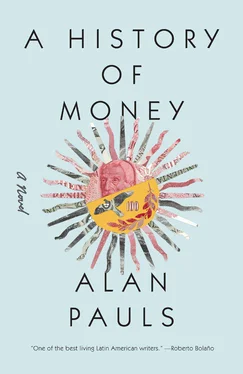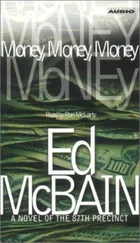It’s less than the price of one of the two packets of cigarettes his father has smoked every day since he was thirteen years old, and twice what the nurse who responds to the bell pays for the packet of peppermint gum she buys every time she works overnight in intensive care, a well-chewed stick of which is now releasing its last languid reserves of flavor into her mouth. No, it’s not dementia, it’s disorientation, says the nurse, and, charged with this unexpected technical nuance, the word feels new and gleams as though he were hearing it for the first time. It’s common in surgical patients who spend a long time isolated in intensive care, without the vital contact with the world — day, night, other people, the TV news — that makes it through, albeit in regulated form, to normal hospital rooms. And it’s while he’s in this trance, a sort of benign, candid dizziness that makes him seem like a drunk child, which can devastate and bring tears of laughter at the same time and last for hours unbroken by anyone or anything, dragging its shipwrecked subject to extremes of delirium — it’s while he’s in this state that his father is suddenly swept along by the topic of conversation (money: the four, five, twenty, or thirty thousand pesos he must give to the morning nurse, the only one in this pseudo-German hospital with whom he can sing German children’s songs, which besides the language rotting inside him because he never speaks it to anyone any longer is the only treasure he has left of the Germany he left behind sixty-eight years earlier) and sets about digging up those ten hellish days.
It’s hard to follow him. He grasps the basics: that the casualness, almost indifference with which his father told him that the money would be returned to him in stages was nothing but a bluff, a cover sustained only by an enormous effort in order to buy himself time to search for and, if he was lucky, find the pair of lowlifes in charge of the “financial operation” in which the money had supposedly ended up, twin brothers who don’t answer the phone for days, or go to the extravagant offices they only use for occasional cups of coffee, checking the mail, and admiring the calves of the numerous secretaries who’ll soon end up on the street. The matter gets more complicated with every day, every hour, every minute that passes, because that’s how things are in the demented economy of the day: forever dividing, getting smaller and smaller until the whole weight of events is concentrated on a single point — the present — which might not withstand the pressure. He hears rumors that the twins are in Uruguay, maybe in prison, or buying land, or competing together for all they’re worth in an offshore regatta; in any case very far, geographically but moreover morally, from assuming any responsibility to the investors and savers they’ve left behind in Buenos Aires, who spring up like fungus and can be found uselessly standing guard, squeezing homemade receipts signed by some flunky in their fists, in the bars near the office, the parking lot where the twins have left their latest-model cars, and the country houses (also twin) where they live — or used to live before the embezzlement — with their blond wives, who are tan even in the middle of winter from sun reflected on snow. It’s difficult to figure out the order of events from his father’s account — if account is the right word for the coils of memory he twines and untwines in the darkness of the intensive care unit, his eyes like saucers, like the eyes of someone who’s sleepwalking or has been possessed or hypnotized; the dry, glassy eyes associated with psychotropic drugs, which always seem to be lit up from the inside — but after a while it seems that actually only one of the pair, the real brains behind the scam, has been seen in Montevideo. The other one — who’s apparently as much a victim as the victims themselves, if not more so, because to the financial blow he suffers must be added the emotional damage that can be caused only by the betrayal of one’s own flesh and blood — stayed in Buenos Aires, in hiding, hoping to buy himself some time and breathe a little, but ultimately intending to show his face and deal with his contractual obligations. His father exhausts his means. He leaves no contact untried, knocks on every door, spends hours by the phone. In his father’s version, the characters get confused; names, nicknames, and jobs are switched and rarely return to their original positions: suddenly the fugitive twin weathering the storm in his cousin’s garage has the features, bushy mustache, and vices of a former work contact of his father’s, a man who gets arrested for having a secret phone line; and the methods his father uses to gather the money he owes sound too much like his schemes for doing the only thing he’s trained to do, clear up the mess, a prime example being the case of the pharmaceutical company that hires him to arrange an end-of-year trip as a reward for its staff and then, pleading financial difficulties, pays him six months late for the almost ninety airfares for which his father had to pay the airline strictly on time. What’s clear, in any case, is that his father rolls up his sleeves, uses some contacts he isn’t proud to have, gives up certain rights in exchange for information, and finally finds the twin; and once he gets to the damp, poorly lit garage where he’s set up a sort of parody of an office using a table and some plastic garden chairs and an old Bakelite phone, he hears the twin himself, in a tank top and with several days’ worth of stubble, red eyelids, and the brutishness that comes from being locked away — looking just like the hostages of those armed organizations who regained their freedom fifteen years earlier — tell him the very thing he’s feared since the beginning: that he doesn’t have the money, that he doesn’t know when he will have it, that he can’t even promise he’ll ever have it.
Day is beginning to break. He can tell not because of the light, which is still too weak, and which melts as soon as it hits the hospital’s tinted windows, but by the buzz coming from the intensive care unit’s command center, which is increasing, getting more lively and more intense: the sound of a machine warming up. It’s very early in the morning, and everything blends into his father’s soft voice as he lies amid his monitors, which blink impassively while in the room next door a woman with almost no hair clutches her pillow, in the throes of death, and in the one opposite a young athlete lies snoring, the covers cast aside, his heart broken to pieces. So he has to whip up the money — a delinquent use of the phrase he’s always liked. He has to whip it up in record time, and with the utmost discretion, without him, his son, ever suspecting what’s going on. In his father’s confused delirium, the figure ranges between ten, three hundred and fifty, and fifty thousand dollars, the variations almost as capricious and extravagant as the origins his father claims for it in the course of his explanation (a very well-paid job he never had, the sale of a car he never owned, the redundancy payment he still dreams about, and, hidden among these fakes, the real one, the living inheritance given to his son by his mother’s husband); however much it is, though, his father claws it back, a little here, a little there, diverting funds from their intended destinations, helping himself to sums that don’t belong to him, delaying urgent payments. For ten days he floats between scandal and crime with his head underwater, holding his breath. If just one of his maneuvers comes to light, everything will fall apart. After a couple of days of this, there’s nothing, or almost nothing, to distinguish him from the lowlife who conned him. He’s lied, he’s promised things he won’t deliver, he’s got his hands on other people’s money. He still sleeps in his own bed, still bathes and changes his clothes, still walks the streets undisguised and sends his clients to Rio, New York, and Rome. But these privileges won’t last long. One night he inexplicably puts off going home. He sees himself on the CCTV monitor in the window of an electrical appliance store and doesn’t recognize what he sees. He lingers in a bar, and then another, and then another still, and as the hours go by the basements grow more sordid, the air fouler, and the drinks lower-grade (though it’s still always neat whiskey: anything else isn’t alcohol, it’s a bad joke), and the only thing he can feel is nausea. Shame: a kind of cold, black lava, which someone has spilled inside him and which is filling him from head to toe and rapidly turning to stone. And all this, says his father, fixing him with wide-open, shining eyes that can’t even see him any longer, all this for three hundred and fifty dollars? For a return ticket to Rio?
Читать дальше












